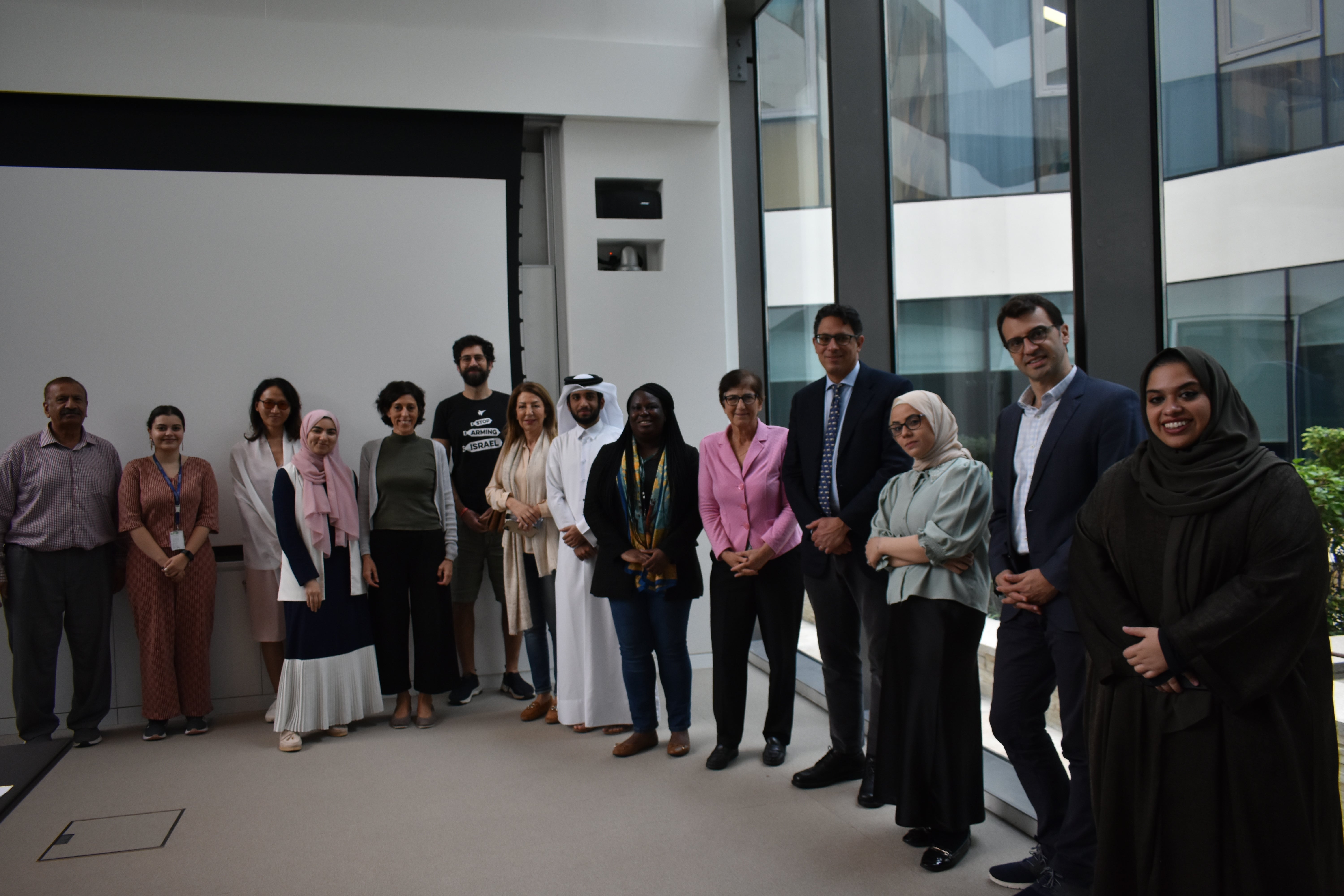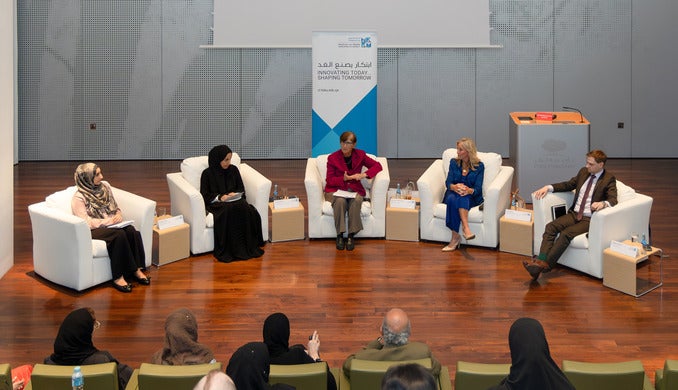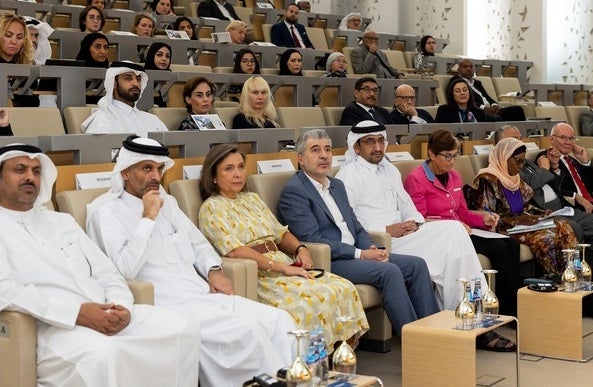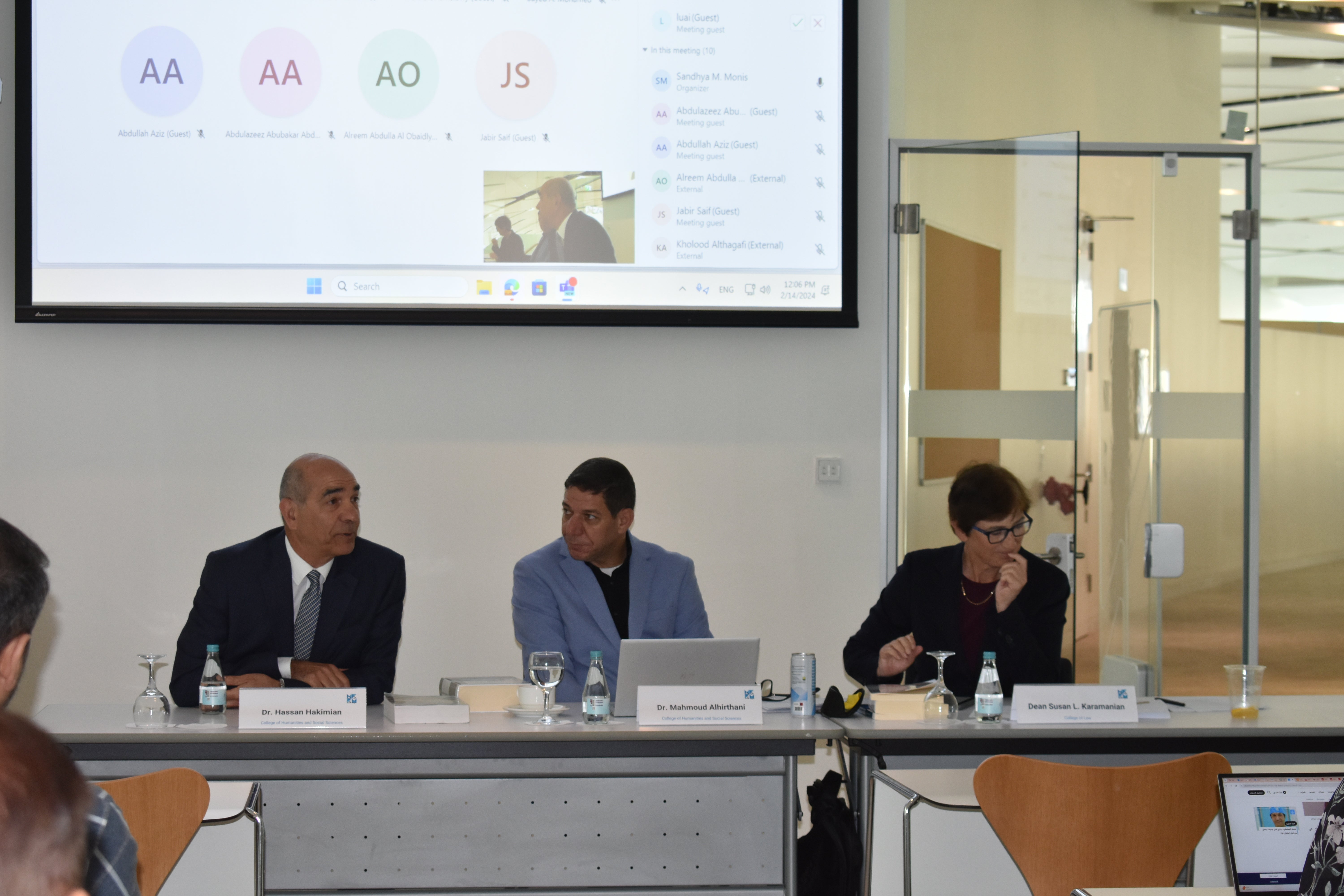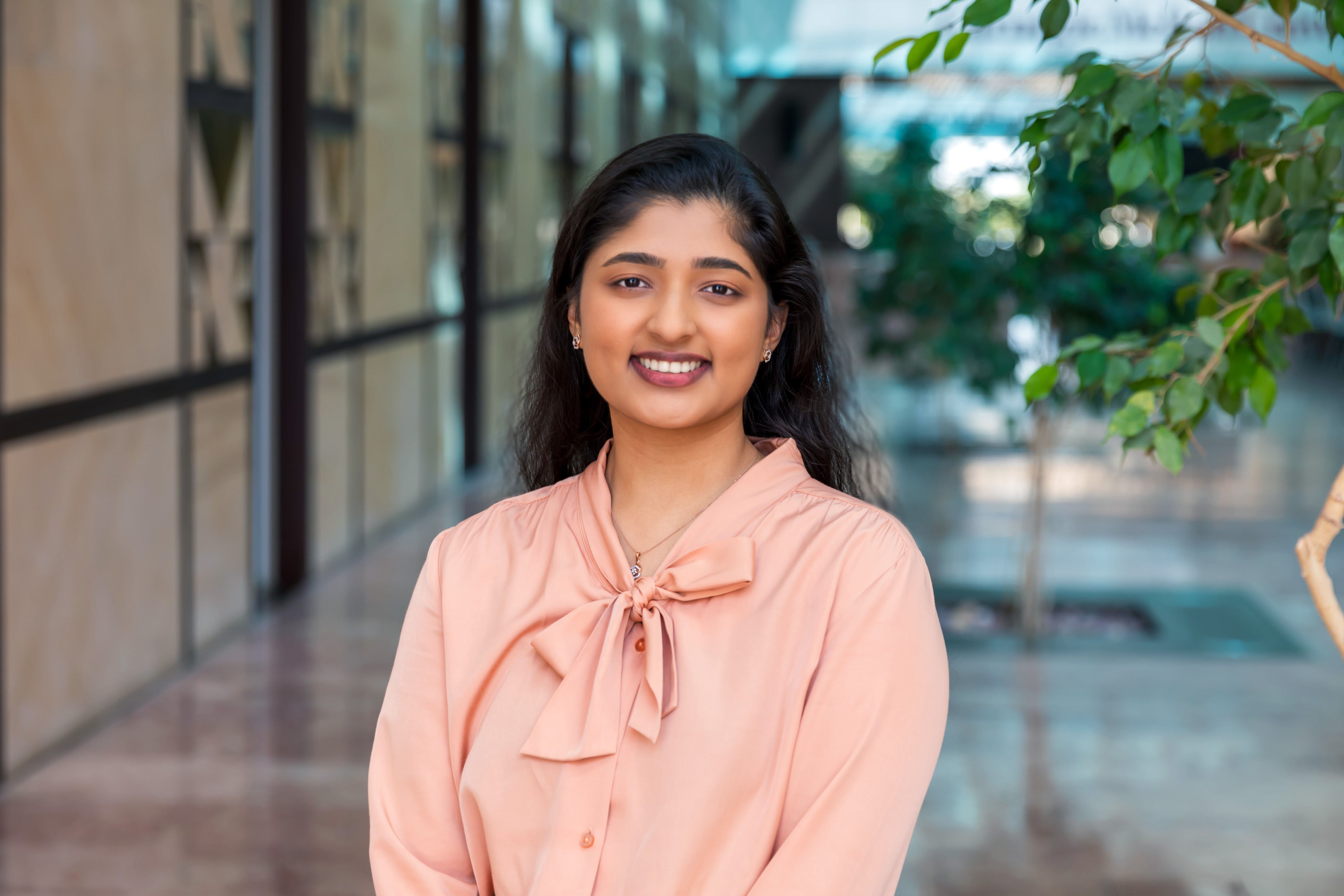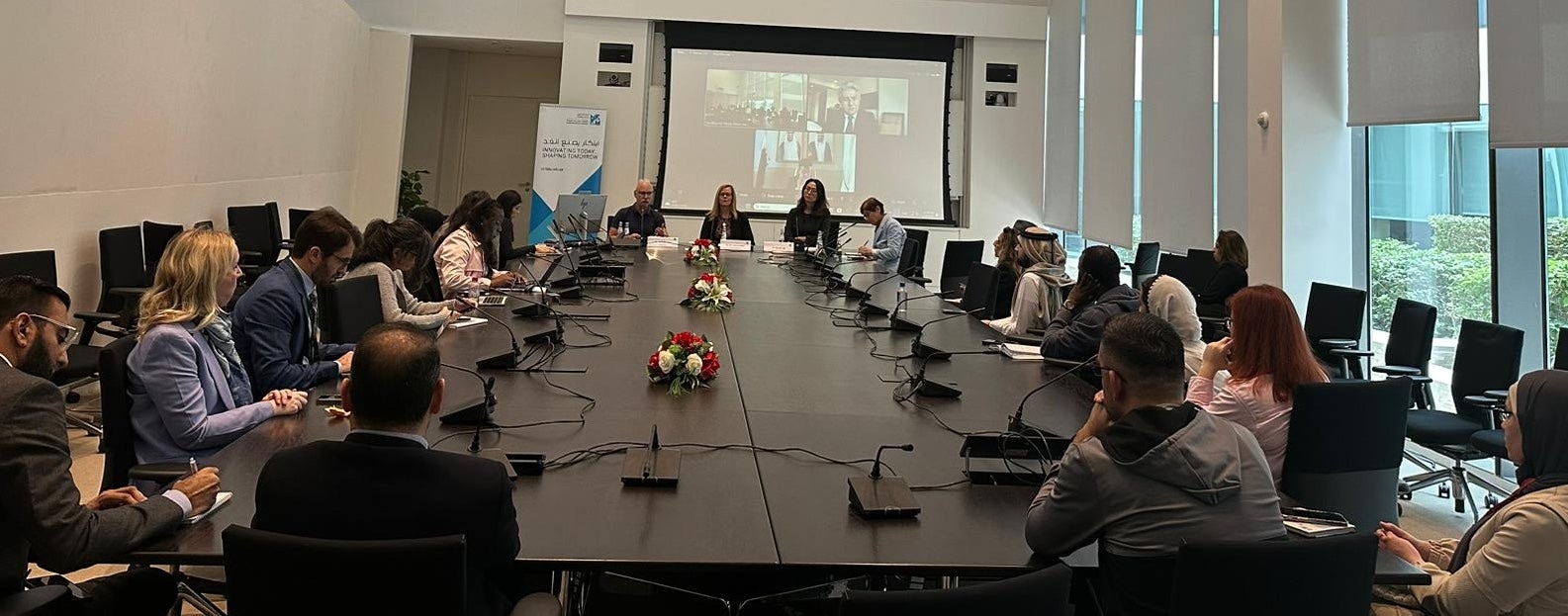
Permanent Mission of the State of Qatar, HBKU and WTO to Host Session at the World Trade Organization Annual Forum

The Permanent Mission of the State of Qatar to the United Nations Office and other international organizations in Geneva, in collaboration with the UNESCO Chair on Environmental Law and Sustainable Development at Hamad Bin Khalifa University (HBKU) and World Trade Organization (WTO), is set to host a high-profile session titled “Sustainable Trade and Entrepreneurship: Pathways to Re-globalization” at this year’s WTO Public Forum in Geneva, Switzerland.
Under the theme Re-Globalization: Better Trade for a Better World, the Forum will focus on the pivotal role of trade facilitation in promoting sustainable development and entrepreneurship. The session, scheduled for September 12th, brings together an esteemed panel of experts to discuss the integration of sustainability into global trade practices and the promotion of sustainable entrepreneurship.
Key speakers include Her Excellency Mrs. Hend Al-Muftah, Ambassador and Permanent Representative of the State of Qatar to the United Nations Office in Geneva; Mr. Ahmed Al-Sulaiti, Director of the Office of the State of Qatar to the WTO and other Economic Organisations in Geneva; Dr. Damilola S. Olawuyi (SAN), Professor and Associate Dean for Research, HBKU, and UNESCO Chairholder on Environmental Law and Sustainable Development, HBKU; Dr. Mena Hassan, Senior Trade Policy and Trade Facilitation Expert, WTO; and Elena Athwal, Research Associate, UNESCO Chair on Environmental Law and Sustainable Development, and S.J.D. student, HBKU.
The session will explore actionable strategies to align global trade practices with the United Nations Sustainable Development Goals (SDGs). Discussions will delve into innovative approaches for integrating sustainability into trade, addressing the challenges and opportunities in promoting sustainable entrepreneurship, and examining the role of digitalization and innovation in fostering inclusive trade practices.
In addition to these discussions, the session will explore how Qatar is embracing innovation to align its judicial processes with the SDGs, particularly SDG 16, which emphasizes peace, justice, and strong institutions. The state’s judicial system is at the forefront of this transformation, leveraging technology and artificial intelligence to enhance efficiency, accessibility, and sustainability in dispute resolution. The session also aims to foster cross-sector collaboration and highlight best practices that can contribute to a more inclusive and sustainable global economy.
The event promises to be a key platform for dialogue on how trade facilitation and innovative judicial practices can serve as catalysts for sustainable development and entrepreneurship in the context of re-globalization.
Related News
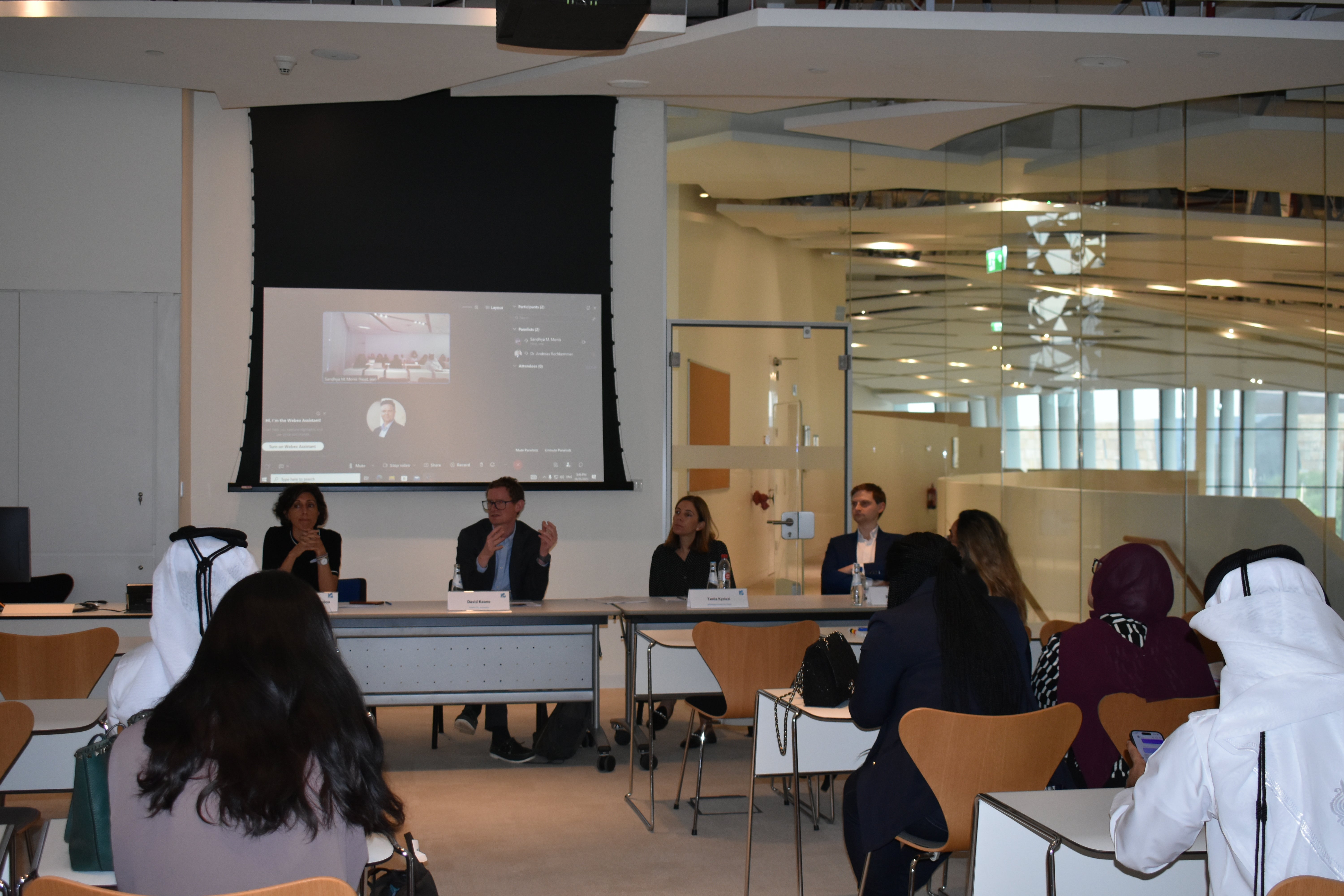
HBKU College of Law Hosts Roundtable on Human Rights in Qatar and the Gulf Region
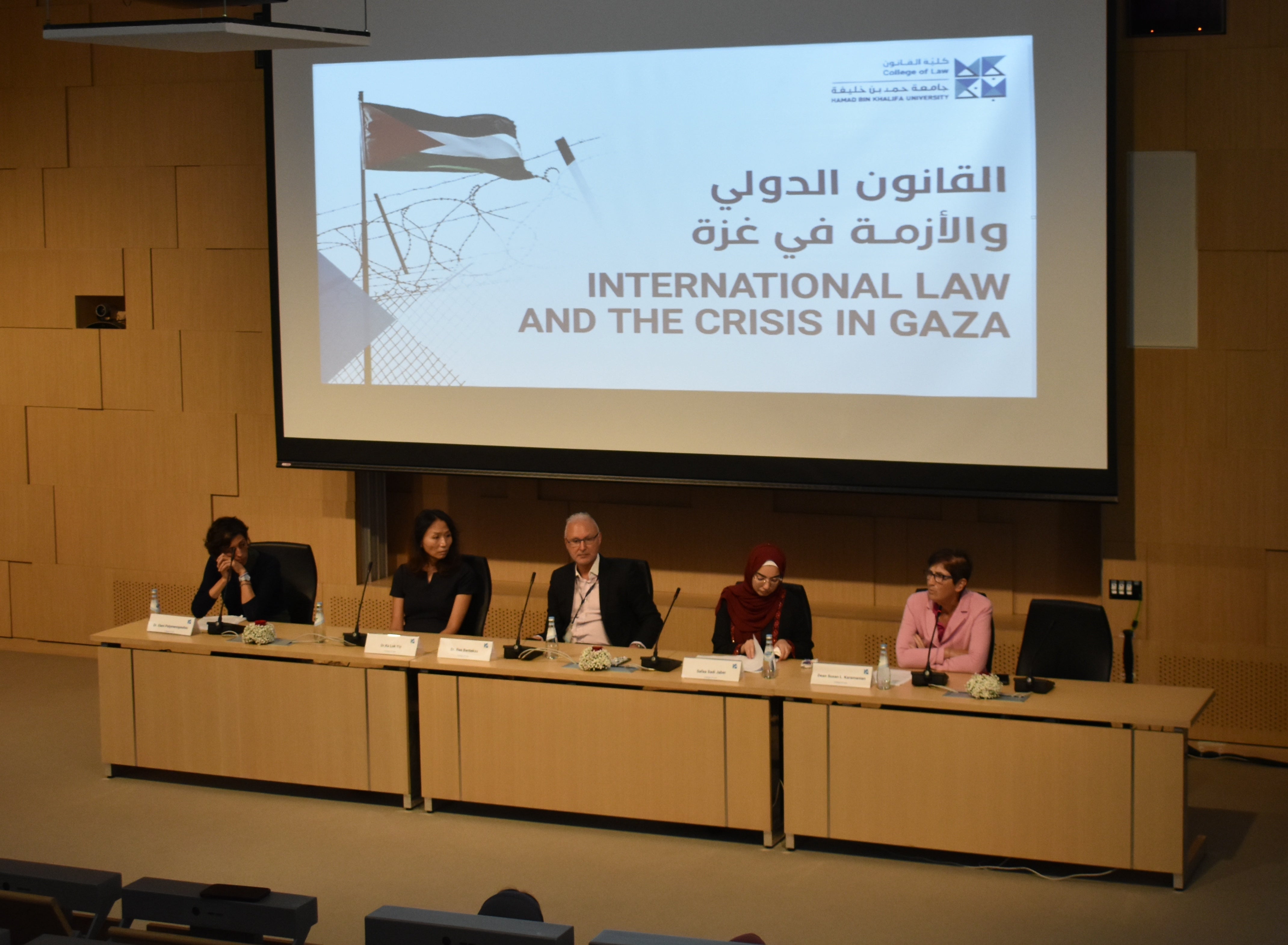
HBKU’s College of Law Panel Examines International Legal Implications of Gaza Crisis
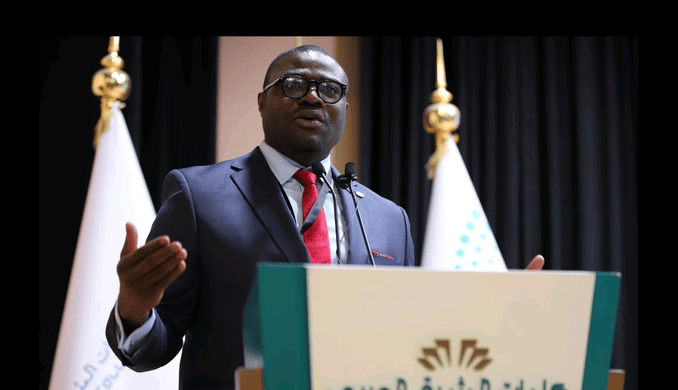
HBKU UNESCO Chair on Environmental Law Supports Regional Dialogue at 6th MENA Environmental Law and Policy Scholars’ Conference

HBKU’s College of Law and Geneva Graduate Institute Discuss Reorienting International Economic Law in the Digital Era
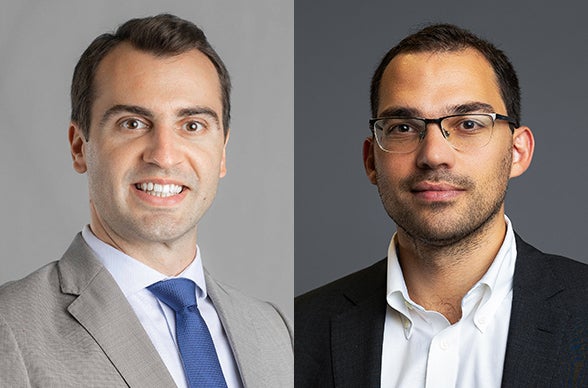
HBKU’s College of Law and Georgetown University in Qatar Launch Joint TradeLab Clinic
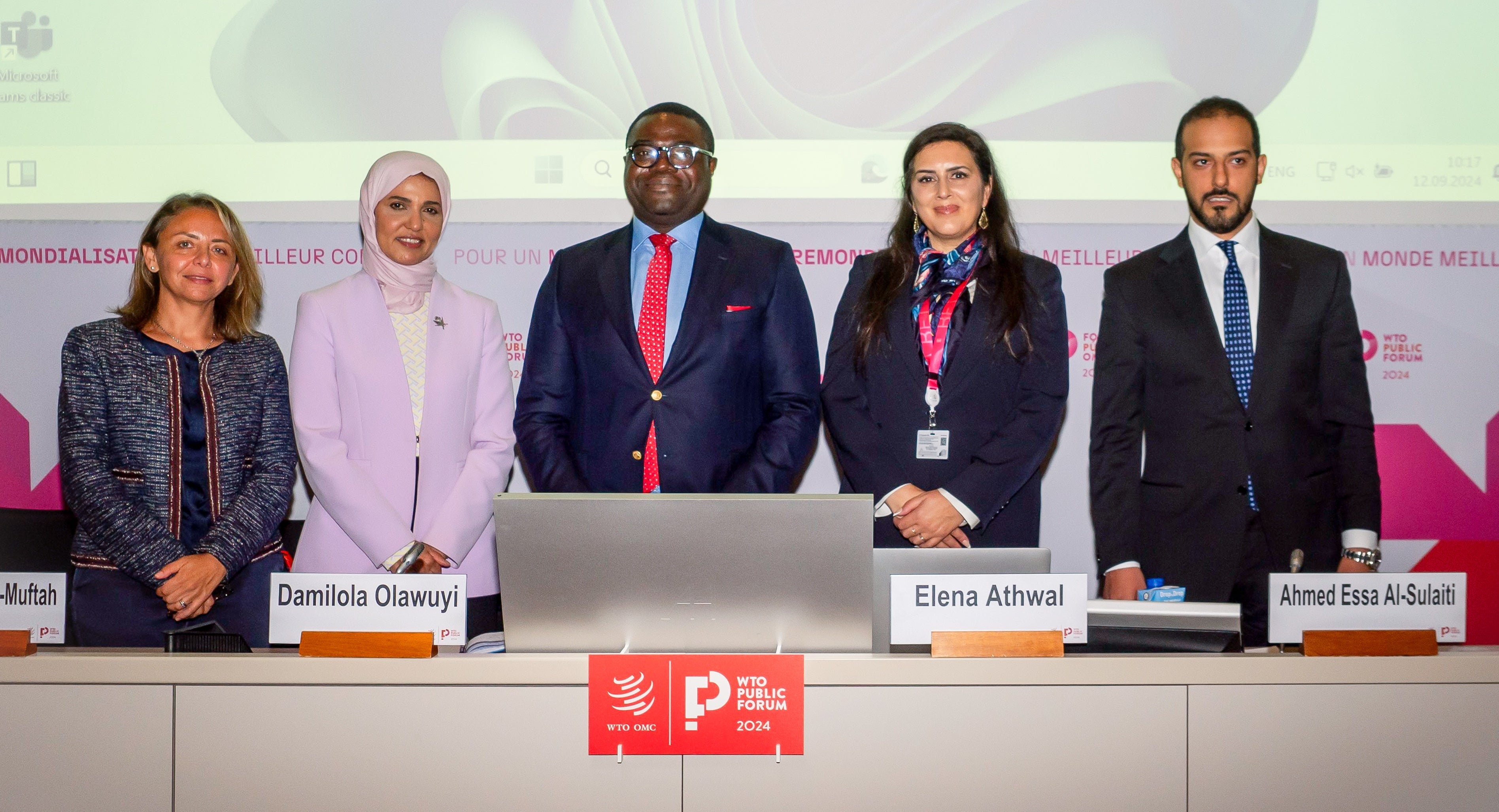
Permanent Mission of the State of Qatar, HBKU, and WTO Hold Discussion on Sustainable Trade at WTO Public Forum
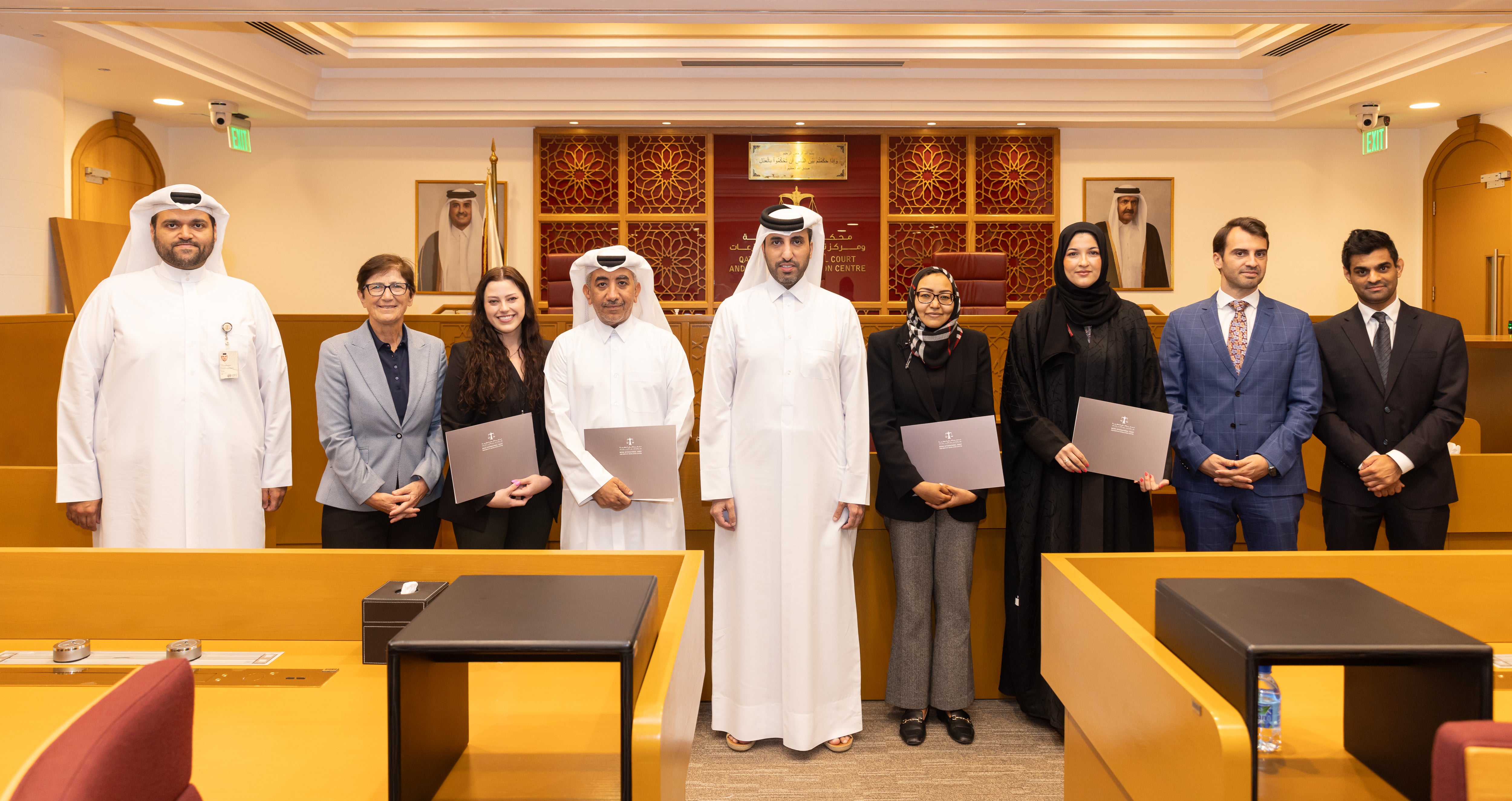
Qatar International Court and Dispute Resolution Centre Honors HBKU College of Law Students
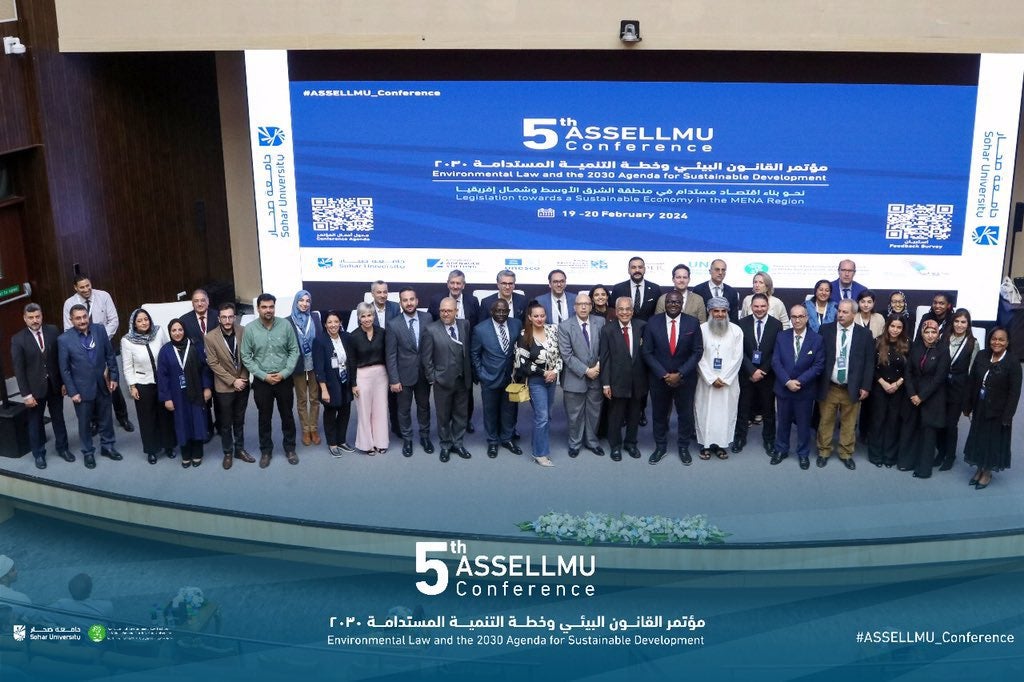
HBKU’s College of Law Co-hosts MENA Environmental Law and Policy Scholars’ Conference in Oman
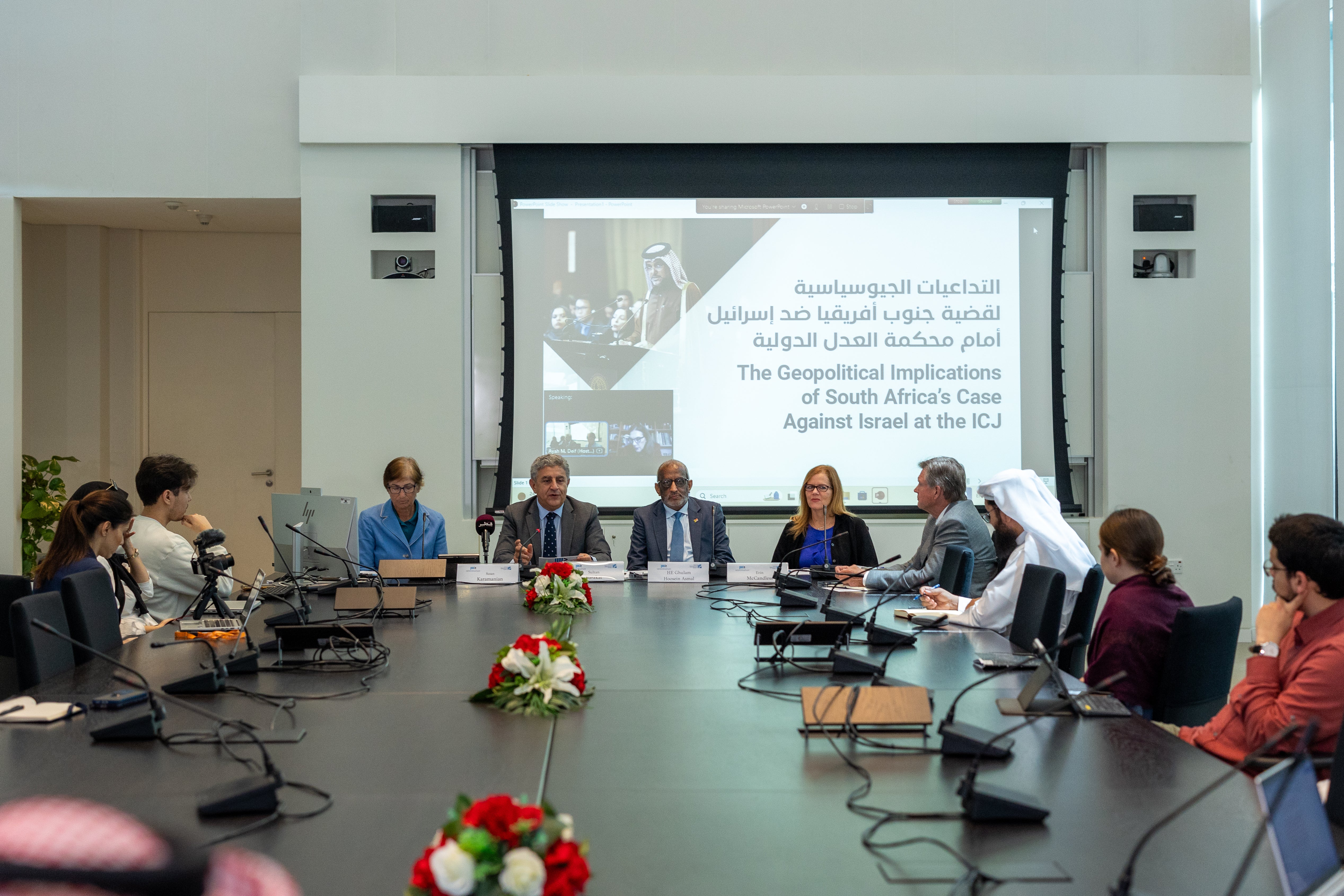
GISR Panel Analyzes Geopolitical Implications of South Africa’s Case against Israel at the ICJ
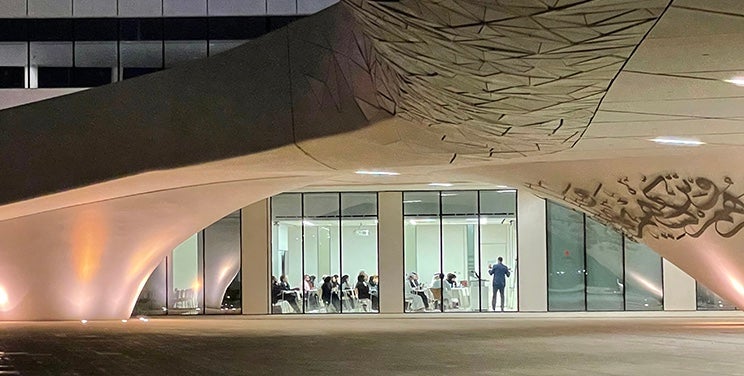
WIPO Academy and Qatar Ministry of Commerce and Industry Support College of Law with Intellectual Property Seminar
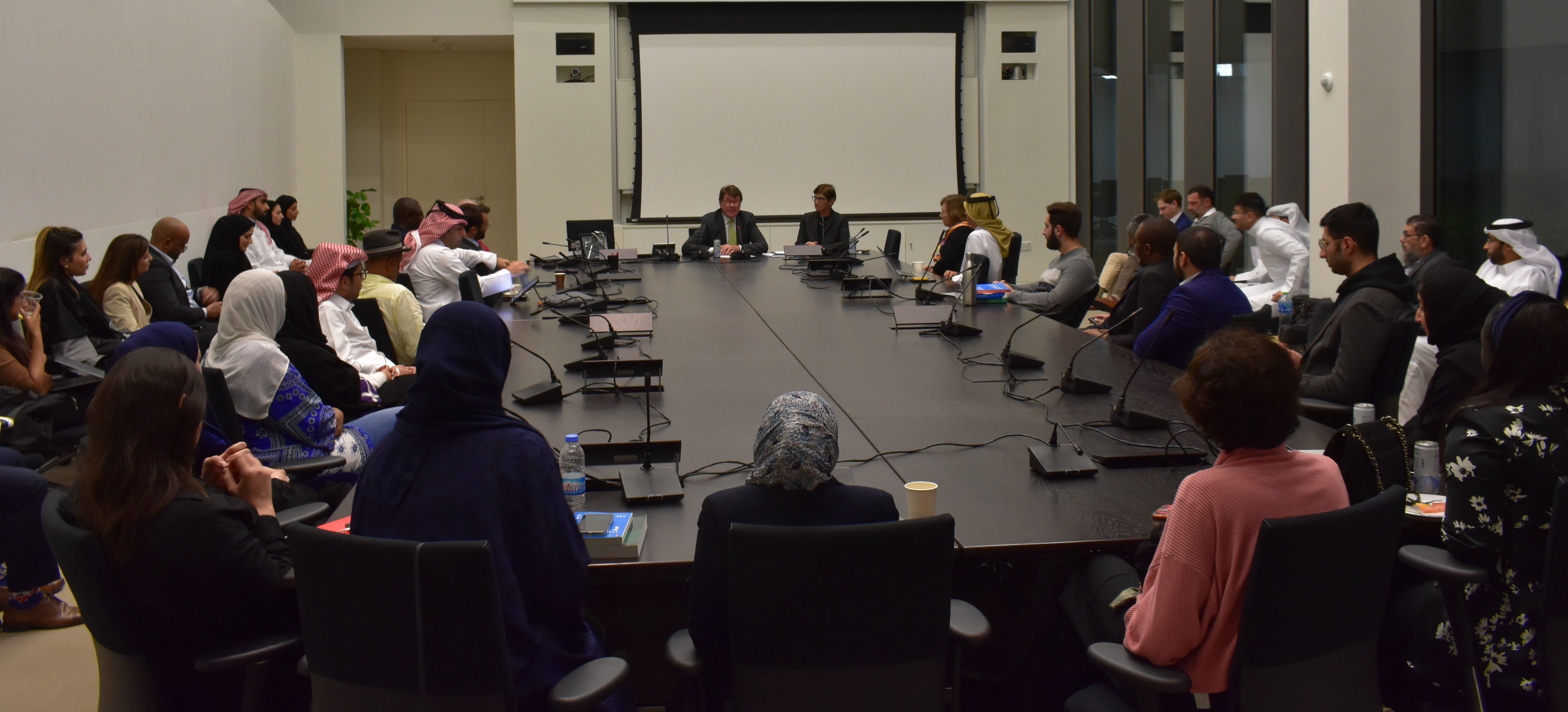
HBKU College of Law Hosts Third Clinton W. Francis Lecture in Legal Professionalism
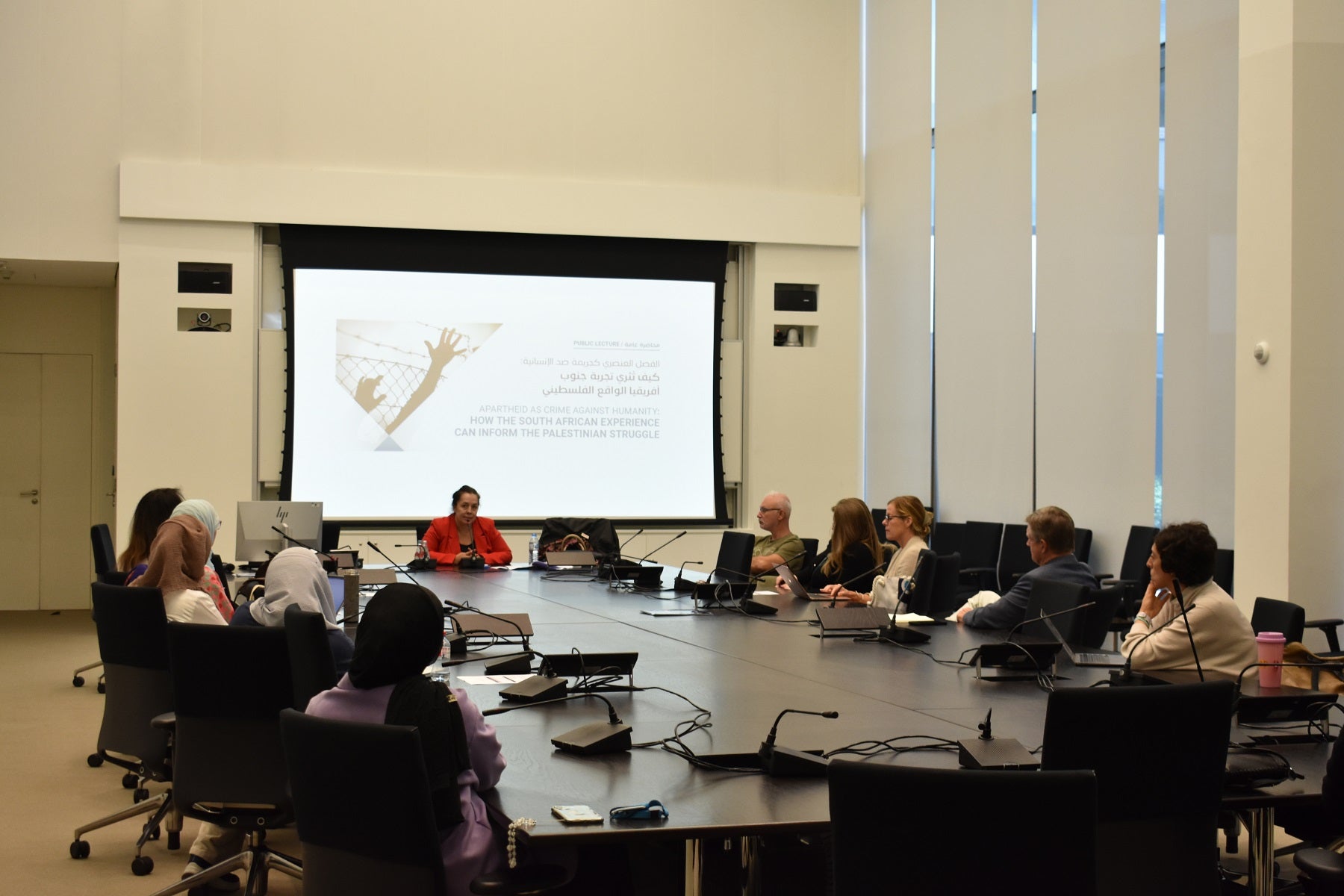
College of Law Holds Public Lecture on How Apartheid Can Inform the Palestinian Struggle
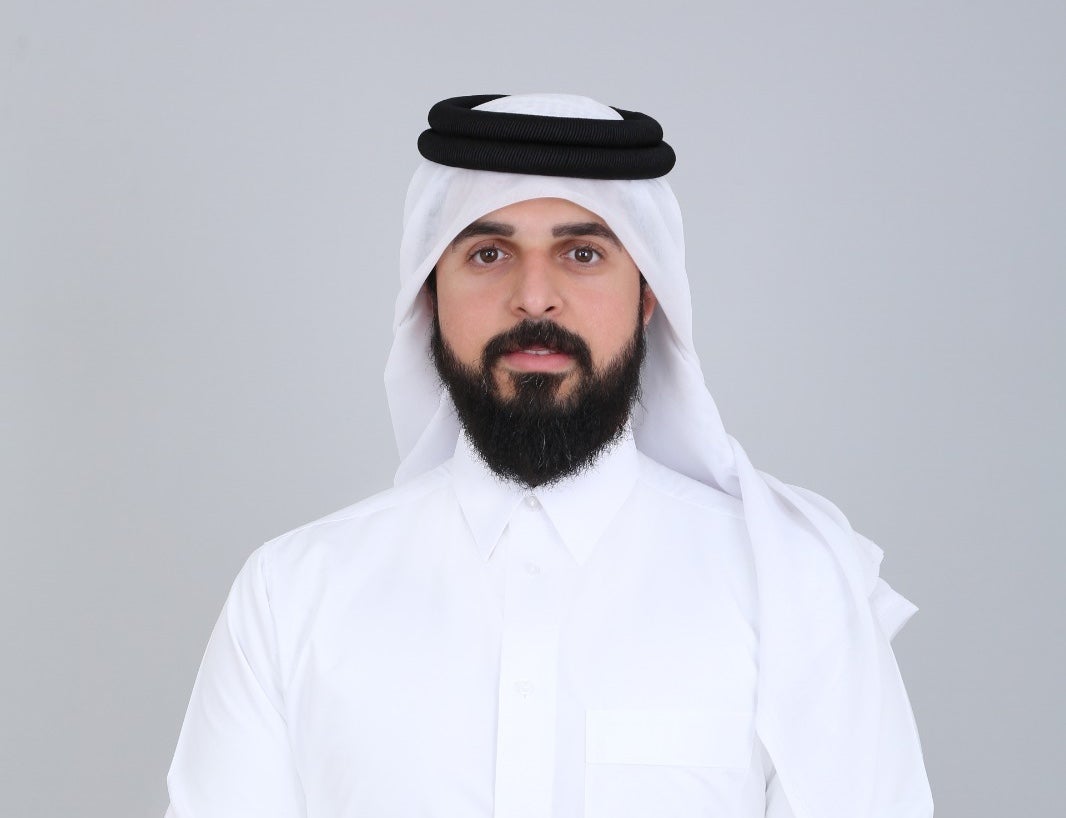
HBKU College of Law Lecturer Appointed to Executive Council of Asian Society of International Law

HBKU College of Law Hosts Roundtable on Human Rights in Qatar and the Gulf Region

HBKU’s College of Law Panel Examines International Legal Implications of Gaza Crisis

HBKU UNESCO Chair on Environmental Law Supports Regional Dialogue at 6th MENA Environmental Law and Policy Scholars’ Conference

HBKU’s College of Law and Geneva Graduate Institute Discuss Reorienting International Economic Law in the Digital Era

HBKU’s College of Law and Georgetown University in Qatar Launch Joint TradeLab Clinic

Permanent Mission of the State of Qatar, HBKU, and WTO Hold Discussion on Sustainable Trade at WTO Public Forum

Qatar International Court and Dispute Resolution Centre Honors HBKU College of Law Students

HBKU’s College of Law Co-hosts MENA Environmental Law and Policy Scholars’ Conference in Oman

GISR Panel Analyzes Geopolitical Implications of South Africa’s Case against Israel at the ICJ

WIPO Academy and Qatar Ministry of Commerce and Industry Support College of Law with Intellectual Property Seminar

HBKU College of Law Hosts Third Clinton W. Francis Lecture in Legal Professionalism

College of Law Holds Public Lecture on How Apartheid Can Inform the Palestinian Struggle

HBKU College of Law Lecturer Appointed to Executive Council of Asian Society of International Law

HBKU College of Law Hosts Roundtable on Human Rights in Qatar and the Gulf Region

HBKU’s College of Law Panel Examines International Legal Implications of Gaza Crisis

HBKU UNESCO Chair on Environmental Law Supports Regional Dialogue at 6th MENA Environmental Law and Policy Scholars’ Conference

HBKU’s College of Law and Geneva Graduate Institute Discuss Reorienting International Economic Law in the Digital Era

HBKU’s College of Law and Georgetown University in Qatar Launch Joint TradeLab Clinic

Permanent Mission of the State of Qatar, HBKU, and WTO Hold Discussion on Sustainable Trade at WTO Public Forum

Qatar International Court and Dispute Resolution Centre Honors HBKU College of Law Students

HBKU’s College of Law Co-hosts MENA Environmental Law and Policy Scholars’ Conference in Oman

GISR Panel Analyzes Geopolitical Implications of South Africa’s Case against Israel at the ICJ

WIPO Academy and Qatar Ministry of Commerce and Industry Support College of Law with Intellectual Property Seminar

HBKU College of Law Hosts Third Clinton W. Francis Lecture in Legal Professionalism

College of Law Holds Public Lecture on How Apartheid Can Inform the Palestinian Struggle

HBKU College of Law Lecturer Appointed to Executive Council of Asian Society of International Law

HBKU College of Law Hosts Roundtable on Human Rights in Qatar and the Gulf Region

HBKU’s College of Law Panel Examines International Legal Implications of Gaza Crisis

HBKU UNESCO Chair on Environmental Law Supports Regional Dialogue at 6th MENA Environmental Law and Policy Scholars’ Conference

HBKU’s College of Law and Geneva Graduate Institute Discuss Reorienting International Economic Law in the Digital Era

HBKU’s College of Law and Georgetown University in Qatar Launch Joint TradeLab Clinic

Permanent Mission of the State of Qatar, HBKU, and WTO Hold Discussion on Sustainable Trade at WTO Public Forum

Qatar International Court and Dispute Resolution Centre Honors HBKU College of Law Students

HBKU’s College of Law Co-hosts MENA Environmental Law and Policy Scholars’ Conference in Oman

GISR Panel Analyzes Geopolitical Implications of South Africa’s Case against Israel at the ICJ

WIPO Academy and Qatar Ministry of Commerce and Industry Support College of Law with Intellectual Property Seminar

HBKU College of Law Hosts Third Clinton W. Francis Lecture in Legal Professionalism

College of Law Holds Public Lecture on How Apartheid Can Inform the Palestinian Struggle

HBKU College of Law Lecturer Appointed to Executive Council of Asian Society of International Law

HBKU College of Law Hosts Roundtable on Human Rights in Qatar and the Gulf Region

HBKU’s College of Law Panel Examines International Legal Implications of Gaza Crisis

HBKU UNESCO Chair on Environmental Law Supports Regional Dialogue at 6th MENA Environmental Law and Policy Scholars’ Conference

HBKU’s College of Law and Geneva Graduate Institute Discuss Reorienting International Economic Law in the Digital Era

HBKU’s College of Law and Georgetown University in Qatar Launch Joint TradeLab Clinic

Permanent Mission of the State of Qatar, HBKU, and WTO Hold Discussion on Sustainable Trade at WTO Public Forum

Qatar International Court and Dispute Resolution Centre Honors HBKU College of Law Students

HBKU’s College of Law Co-hosts MENA Environmental Law and Policy Scholars’ Conference in Oman

GISR Panel Analyzes Geopolitical Implications of South Africa’s Case against Israel at the ICJ

WIPO Academy and Qatar Ministry of Commerce and Industry Support College of Law with Intellectual Property Seminar

HBKU College of Law Hosts Third Clinton W. Francis Lecture in Legal Professionalism

College of Law Holds Public Lecture on How Apartheid Can Inform the Palestinian Struggle

HBKU College of Law Lecturer Appointed to Executive Council of Asian Society of International Law

HBKU College of Law Hosts Roundtable on Human Rights in Qatar and the Gulf Region

HBKU’s College of Law Panel Examines International Legal Implications of Gaza Crisis

HBKU UNESCO Chair on Environmental Law Supports Regional Dialogue at 6th MENA Environmental Law and Policy Scholars’ Conference

HBKU’s College of Law and Geneva Graduate Institute Discuss Reorienting International Economic Law in the Digital Era

HBKU’s College of Law and Georgetown University in Qatar Launch Joint TradeLab Clinic

Permanent Mission of the State of Qatar, HBKU, and WTO Hold Discussion on Sustainable Trade at WTO Public Forum

Qatar International Court and Dispute Resolution Centre Honors HBKU College of Law Students

HBKU’s College of Law Co-hosts MENA Environmental Law and Policy Scholars’ Conference in Oman

GISR Panel Analyzes Geopolitical Implications of South Africa’s Case against Israel at the ICJ

WIPO Academy and Qatar Ministry of Commerce and Industry Support College of Law with Intellectual Property Seminar

HBKU College of Law Hosts Third Clinton W. Francis Lecture in Legal Professionalism

College of Law Holds Public Lecture on How Apartheid Can Inform the Palestinian Struggle

HBKU College of Law Lecturer Appointed to Executive Council of Asian Society of International Law

HBKU College of Law Hosts Roundtable on Human Rights in Qatar and the Gulf Region

HBKU’s College of Law Panel Examines International Legal Implications of Gaza Crisis

HBKU UNESCO Chair on Environmental Law Supports Regional Dialogue at 6th MENA Environmental Law and Policy Scholars’ Conference

HBKU’s College of Law and Geneva Graduate Institute Discuss Reorienting International Economic Law in the Digital Era

HBKU’s College of Law and Georgetown University in Qatar Launch Joint TradeLab Clinic

Permanent Mission of the State of Qatar, HBKU, and WTO Hold Discussion on Sustainable Trade at WTO Public Forum

Qatar International Court and Dispute Resolution Centre Honors HBKU College of Law Students

HBKU’s College of Law Co-hosts MENA Environmental Law and Policy Scholars’ Conference in Oman

GISR Panel Analyzes Geopolitical Implications of South Africa’s Case against Israel at the ICJ

WIPO Academy and Qatar Ministry of Commerce and Industry Support College of Law with Intellectual Property Seminar

HBKU College of Law Hosts Third Clinton W. Francis Lecture in Legal Professionalism

College of Law Holds Public Lecture on How Apartheid Can Inform the Palestinian Struggle

HBKU College of Law Lecturer Appointed to Executive Council of Asian Society of International Law

HBKU College of Law Hosts Roundtable on Human Rights in Qatar and the Gulf Region

HBKU’s College of Law Panel Examines International Legal Implications of Gaza Crisis

HBKU UNESCO Chair on Environmental Law Supports Regional Dialogue at 6th MENA Environmental Law and Policy Scholars’ Conference

HBKU’s College of Law and Geneva Graduate Institute Discuss Reorienting International Economic Law in the Digital Era

HBKU’s College of Law and Georgetown University in Qatar Launch Joint TradeLab Clinic

Permanent Mission of the State of Qatar, HBKU, and WTO Hold Discussion on Sustainable Trade at WTO Public Forum

Qatar International Court and Dispute Resolution Centre Honors HBKU College of Law Students

HBKU’s College of Law Co-hosts MENA Environmental Law and Policy Scholars’ Conference in Oman

GISR Panel Analyzes Geopolitical Implications of South Africa’s Case against Israel at the ICJ

WIPO Academy and Qatar Ministry of Commerce and Industry Support College of Law with Intellectual Property Seminar

HBKU College of Law Hosts Third Clinton W. Francis Lecture in Legal Professionalism

College of Law Holds Public Lecture on How Apartheid Can Inform the Palestinian Struggle

HBKU College of Law Lecturer Appointed to Executive Council of Asian Society of International Law

HBKU College of Law Hosts Roundtable on Human Rights in Qatar and the Gulf Region

HBKU’s College of Law Panel Examines International Legal Implications of Gaza Crisis

HBKU UNESCO Chair on Environmental Law Supports Regional Dialogue at 6th MENA Environmental Law and Policy Scholars’ Conference

HBKU’s College of Law and Geneva Graduate Institute Discuss Reorienting International Economic Law in the Digital Era

HBKU’s College of Law and Georgetown University in Qatar Launch Joint TradeLab Clinic

Permanent Mission of the State of Qatar, HBKU, and WTO Hold Discussion on Sustainable Trade at WTO Public Forum

Qatar International Court and Dispute Resolution Centre Honors HBKU College of Law Students

HBKU’s College of Law Co-hosts MENA Environmental Law and Policy Scholars’ Conference in Oman

GISR Panel Analyzes Geopolitical Implications of South Africa’s Case against Israel at the ICJ

WIPO Academy and Qatar Ministry of Commerce and Industry Support College of Law with Intellectual Property Seminar

HBKU College of Law Hosts Third Clinton W. Francis Lecture in Legal Professionalism

College of Law Holds Public Lecture on How Apartheid Can Inform the Palestinian Struggle

HBKU College of Law Lecturer Appointed to Executive Council of Asian Society of International Law

HBKU College of Law Hosts Roundtable on Human Rights in Qatar and the Gulf Region

HBKU’s College of Law Panel Examines International Legal Implications of Gaza Crisis

HBKU UNESCO Chair on Environmental Law Supports Regional Dialogue at 6th MENA Environmental Law and Policy Scholars’ Conference

HBKU’s College of Law and Geneva Graduate Institute Discuss Reorienting International Economic Law in the Digital Era

HBKU’s College of Law and Georgetown University in Qatar Launch Joint TradeLab Clinic

Permanent Mission of the State of Qatar, HBKU, and WTO Hold Discussion on Sustainable Trade at WTO Public Forum

Qatar International Court and Dispute Resolution Centre Honors HBKU College of Law Students

HBKU’s College of Law Co-hosts MENA Environmental Law and Policy Scholars’ Conference in Oman

GISR Panel Analyzes Geopolitical Implications of South Africa’s Case against Israel at the ICJ

WIPO Academy and Qatar Ministry of Commerce and Industry Support College of Law with Intellectual Property Seminar

HBKU College of Law Hosts Third Clinton W. Francis Lecture in Legal Professionalism

College of Law Holds Public Lecture on How Apartheid Can Inform the Palestinian Struggle

HBKU College of Law Lecturer Appointed to Executive Council of Asian Society of International Law

HBKU College of Law Hosts Roundtable on Human Rights in Qatar and the Gulf Region

HBKU’s College of Law Panel Examines International Legal Implications of Gaza Crisis

HBKU UNESCO Chair on Environmental Law Supports Regional Dialogue at 6th MENA Environmental Law and Policy Scholars’ Conference

HBKU’s College of Law and Geneva Graduate Institute Discuss Reorienting International Economic Law in the Digital Era

HBKU’s College of Law and Georgetown University in Qatar Launch Joint TradeLab Clinic

Permanent Mission of the State of Qatar, HBKU, and WTO Hold Discussion on Sustainable Trade at WTO Public Forum

Qatar International Court and Dispute Resolution Centre Honors HBKU College of Law Students

HBKU’s College of Law Co-hosts MENA Environmental Law and Policy Scholars’ Conference in Oman

GISR Panel Analyzes Geopolitical Implications of South Africa’s Case against Israel at the ICJ

WIPO Academy and Qatar Ministry of Commerce and Industry Support College of Law with Intellectual Property Seminar

HBKU College of Law Hosts Third Clinton W. Francis Lecture in Legal Professionalism

College of Law Holds Public Lecture on How Apartheid Can Inform the Palestinian Struggle

HBKU College of Law Lecturer Appointed to Executive Council of Asian Society of International Law

HBKU College of Law Hosts Roundtable on Human Rights in Qatar and the Gulf Region

HBKU’s College of Law Panel Examines International Legal Implications of Gaza Crisis

HBKU UNESCO Chair on Environmental Law Supports Regional Dialogue at 6th MENA Environmental Law and Policy Scholars’ Conference

HBKU’s College of Law and Geneva Graduate Institute Discuss Reorienting International Economic Law in the Digital Era

HBKU’s College of Law and Georgetown University in Qatar Launch Joint TradeLab Clinic

Permanent Mission of the State of Qatar, HBKU, and WTO Hold Discussion on Sustainable Trade at WTO Public Forum

Qatar International Court and Dispute Resolution Centre Honors HBKU College of Law Students

HBKU’s College of Law Co-hosts MENA Environmental Law and Policy Scholars’ Conference in Oman

GISR Panel Analyzes Geopolitical Implications of South Africa’s Case against Israel at the ICJ

WIPO Academy and Qatar Ministry of Commerce and Industry Support College of Law with Intellectual Property Seminar

HBKU College of Law Hosts Third Clinton W. Francis Lecture in Legal Professionalism

College of Law Holds Public Lecture on How Apartheid Can Inform the Palestinian Struggle

HBKU College of Law Lecturer Appointed to Executive Council of Asian Society of International Law

HBKU College of Law Hosts Roundtable on Human Rights in Qatar and the Gulf Region

HBKU’s College of Law Panel Examines International Legal Implications of Gaza Crisis

HBKU UNESCO Chair on Environmental Law Supports Regional Dialogue at 6th MENA Environmental Law and Policy Scholars’ Conference

HBKU’s College of Law and Geneva Graduate Institute Discuss Reorienting International Economic Law in the Digital Era

HBKU’s College of Law and Georgetown University in Qatar Launch Joint TradeLab Clinic

Permanent Mission of the State of Qatar, HBKU, and WTO Hold Discussion on Sustainable Trade at WTO Public Forum

Qatar International Court and Dispute Resolution Centre Honors HBKU College of Law Students

HBKU’s College of Law Co-hosts MENA Environmental Law and Policy Scholars’ Conference in Oman

GISR Panel Analyzes Geopolitical Implications of South Africa’s Case against Israel at the ICJ

WIPO Academy and Qatar Ministry of Commerce and Industry Support College of Law with Intellectual Property Seminar

HBKU College of Law Hosts Third Clinton W. Francis Lecture in Legal Professionalism

College of Law Holds Public Lecture on How Apartheid Can Inform the Palestinian Struggle

HBKU College of Law Lecturer Appointed to Executive Council of Asian Society of International Law

HBKU College of Law Hosts Roundtable on Human Rights in Qatar and the Gulf Region

HBKU’s College of Law Panel Examines International Legal Implications of Gaza Crisis

HBKU UNESCO Chair on Environmental Law Supports Regional Dialogue at 6th MENA Environmental Law and Policy Scholars’ Conference

HBKU’s College of Law and Geneva Graduate Institute Discuss Reorienting International Economic Law in the Digital Era

HBKU’s College of Law and Georgetown University in Qatar Launch Joint TradeLab Clinic

Permanent Mission of the State of Qatar, HBKU, and WTO Hold Discussion on Sustainable Trade at WTO Public Forum

Qatar International Court and Dispute Resolution Centre Honors HBKU College of Law Students

HBKU’s College of Law Co-hosts MENA Environmental Law and Policy Scholars’ Conference in Oman

GISR Panel Analyzes Geopolitical Implications of South Africa’s Case against Israel at the ICJ

WIPO Academy and Qatar Ministry of Commerce and Industry Support College of Law with Intellectual Property Seminar

HBKU College of Law Hosts Third Clinton W. Francis Lecture in Legal Professionalism

College of Law Holds Public Lecture on How Apartheid Can Inform the Palestinian Struggle

HBKU College of Law Lecturer Appointed to Executive Council of Asian Society of International Law

HBKU College of Law Hosts Roundtable on Human Rights in Qatar and the Gulf Region

HBKU’s College of Law Panel Examines International Legal Implications of Gaza Crisis

HBKU UNESCO Chair on Environmental Law Supports Regional Dialogue at 6th MENA Environmental Law and Policy Scholars’ Conference

HBKU’s College of Law and Geneva Graduate Institute Discuss Reorienting International Economic Law in the Digital Era

HBKU’s College of Law and Georgetown University in Qatar Launch Joint TradeLab Clinic

Permanent Mission of the State of Qatar, HBKU, and WTO Hold Discussion on Sustainable Trade at WTO Public Forum

Qatar International Court and Dispute Resolution Centre Honors HBKU College of Law Students

HBKU’s College of Law Co-hosts MENA Environmental Law and Policy Scholars’ Conference in Oman

GISR Panel Analyzes Geopolitical Implications of South Africa’s Case against Israel at the ICJ

WIPO Academy and Qatar Ministry of Commerce and Industry Support College of Law with Intellectual Property Seminar

HBKU College of Law Hosts Third Clinton W. Francis Lecture in Legal Professionalism

College of Law Holds Public Lecture on How Apartheid Can Inform the Palestinian Struggle

HBKU College of Law Lecturer Appointed to Executive Council of Asian Society of International Law

HBKU College of Law Hosts Roundtable on Human Rights in Qatar and the Gulf Region

HBKU’s College of Law Panel Examines International Legal Implications of Gaza Crisis

HBKU UNESCO Chair on Environmental Law Supports Regional Dialogue at 6th MENA Environmental Law and Policy Scholars’ Conference

HBKU’s College of Law and Geneva Graduate Institute Discuss Reorienting International Economic Law in the Digital Era

HBKU’s College of Law and Georgetown University in Qatar Launch Joint TradeLab Clinic

Permanent Mission of the State of Qatar, HBKU, and WTO Hold Discussion on Sustainable Trade at WTO Public Forum

Qatar International Court and Dispute Resolution Centre Honors HBKU College of Law Students

HBKU’s College of Law Co-hosts MENA Environmental Law and Policy Scholars’ Conference in Oman

GISR Panel Analyzes Geopolitical Implications of South Africa’s Case against Israel at the ICJ

WIPO Academy and Qatar Ministry of Commerce and Industry Support College of Law with Intellectual Property Seminar

HBKU College of Law Hosts Third Clinton W. Francis Lecture in Legal Professionalism

College of Law Holds Public Lecture on How Apartheid Can Inform the Palestinian Struggle

HBKU College of Law Lecturer Appointed to Executive Council of Asian Society of International Law

HBKU College of Law Hosts Roundtable on Human Rights in Qatar and the Gulf Region

HBKU’s College of Law Panel Examines International Legal Implications of Gaza Crisis

HBKU UNESCO Chair on Environmental Law Supports Regional Dialogue at 6th MENA Environmental Law and Policy Scholars’ Conference

HBKU’s College of Law and Geneva Graduate Institute Discuss Reorienting International Economic Law in the Digital Era

HBKU’s College of Law and Georgetown University in Qatar Launch Joint TradeLab Clinic

Permanent Mission of the State of Qatar, HBKU, and WTO Hold Discussion on Sustainable Trade at WTO Public Forum

Qatar International Court and Dispute Resolution Centre Honors HBKU College of Law Students

HBKU’s College of Law Co-hosts MENA Environmental Law and Policy Scholars’ Conference in Oman

GISR Panel Analyzes Geopolitical Implications of South Africa’s Case against Israel at the ICJ

WIPO Academy and Qatar Ministry of Commerce and Industry Support College of Law with Intellectual Property Seminar

HBKU College of Law Hosts Third Clinton W. Francis Lecture in Legal Professionalism

College of Law Holds Public Lecture on How Apartheid Can Inform the Palestinian Struggle

HBKU College of Law Lecturer Appointed to Executive Council of Asian Society of International Law

HBKU College of Law Hosts Roundtable on Human Rights in Qatar and the Gulf Region

HBKU’s College of Law Panel Examines International Legal Implications of Gaza Crisis

HBKU UNESCO Chair on Environmental Law Supports Regional Dialogue at 6th MENA Environmental Law and Policy Scholars’ Conference

HBKU’s College of Law and Geneva Graduate Institute Discuss Reorienting International Economic Law in the Digital Era

HBKU’s College of Law and Georgetown University in Qatar Launch Joint TradeLab Clinic

Permanent Mission of the State of Qatar, HBKU, and WTO Hold Discussion on Sustainable Trade at WTO Public Forum

Qatar International Court and Dispute Resolution Centre Honors HBKU College of Law Students

HBKU’s College of Law Co-hosts MENA Environmental Law and Policy Scholars’ Conference in Oman

GISR Panel Analyzes Geopolitical Implications of South Africa’s Case against Israel at the ICJ

WIPO Academy and Qatar Ministry of Commerce and Industry Support College of Law with Intellectual Property Seminar

HBKU College of Law Hosts Third Clinton W. Francis Lecture in Legal Professionalism

College of Law Holds Public Lecture on How Apartheid Can Inform the Palestinian Struggle

HBKU College of Law Lecturer Appointed to Executive Council of Asian Society of International Law

HBKU College of Law Hosts Roundtable on Human Rights in Qatar and the Gulf Region

HBKU’s College of Law Panel Examines International Legal Implications of Gaza Crisis

HBKU UNESCO Chair on Environmental Law Supports Regional Dialogue at 6th MENA Environmental Law and Policy Scholars’ Conference

HBKU’s College of Law and Geneva Graduate Institute Discuss Reorienting International Economic Law in the Digital Era

HBKU’s College of Law and Georgetown University in Qatar Launch Joint TradeLab Clinic

Permanent Mission of the State of Qatar, HBKU, and WTO Hold Discussion on Sustainable Trade at WTO Public Forum

Qatar International Court and Dispute Resolution Centre Honors HBKU College of Law Students

HBKU’s College of Law Co-hosts MENA Environmental Law and Policy Scholars’ Conference in Oman

GISR Panel Analyzes Geopolitical Implications of South Africa’s Case against Israel at the ICJ

WIPO Academy and Qatar Ministry of Commerce and Industry Support College of Law with Intellectual Property Seminar

HBKU College of Law Hosts Third Clinton W. Francis Lecture in Legal Professionalism

College of Law Holds Public Lecture on How Apartheid Can Inform the Palestinian Struggle

HBKU College of Law Lecturer Appointed to Executive Council of Asian Society of International Law

HBKU College of Law Hosts Roundtable on Human Rights in Qatar and the Gulf Region

HBKU’s College of Law Panel Examines International Legal Implications of Gaza Crisis

HBKU UNESCO Chair on Environmental Law Supports Regional Dialogue at 6th MENA Environmental Law and Policy Scholars’ Conference

HBKU’s College of Law and Geneva Graduate Institute Discuss Reorienting International Economic Law in the Digital Era

HBKU’s College of Law and Georgetown University in Qatar Launch Joint TradeLab Clinic

Permanent Mission of the State of Qatar, HBKU, and WTO Hold Discussion on Sustainable Trade at WTO Public Forum

Qatar International Court and Dispute Resolution Centre Honors HBKU College of Law Students

HBKU’s College of Law Co-hosts MENA Environmental Law and Policy Scholars’ Conference in Oman

GISR Panel Analyzes Geopolitical Implications of South Africa’s Case against Israel at the ICJ

WIPO Academy and Qatar Ministry of Commerce and Industry Support College of Law with Intellectual Property Seminar

HBKU College of Law Hosts Third Clinton W. Francis Lecture in Legal Professionalism

College of Law Holds Public Lecture on How Apartheid Can Inform the Palestinian Struggle

HBKU College of Law Lecturer Appointed to Executive Council of Asian Society of International Law

HBKU College of Law Hosts Roundtable on Human Rights in Qatar and the Gulf Region

HBKU’s College of Law Panel Examines International Legal Implications of Gaza Crisis

HBKU UNESCO Chair on Environmental Law Supports Regional Dialogue at 6th MENA Environmental Law and Policy Scholars’ Conference

HBKU’s College of Law and Geneva Graduate Institute Discuss Reorienting International Economic Law in the Digital Era

HBKU’s College of Law and Georgetown University in Qatar Launch Joint TradeLab Clinic

Permanent Mission of the State of Qatar, HBKU, and WTO Hold Discussion on Sustainable Trade at WTO Public Forum

Qatar International Court and Dispute Resolution Centre Honors HBKU College of Law Students

HBKU’s College of Law Co-hosts MENA Environmental Law and Policy Scholars’ Conference in Oman

GISR Panel Analyzes Geopolitical Implications of South Africa’s Case against Israel at the ICJ

WIPO Academy and Qatar Ministry of Commerce and Industry Support College of Law with Intellectual Property Seminar

HBKU College of Law Hosts Third Clinton W. Francis Lecture in Legal Professionalism

College of Law Holds Public Lecture on How Apartheid Can Inform the Palestinian Struggle

HBKU College of Law Lecturer Appointed to Executive Council of Asian Society of International Law

HBKU College of Law Hosts Roundtable on Human Rights in Qatar and the Gulf Region

HBKU’s College of Law Panel Examines International Legal Implications of Gaza Crisis

HBKU UNESCO Chair on Environmental Law Supports Regional Dialogue at 6th MENA Environmental Law and Policy Scholars’ Conference

HBKU’s College of Law and Geneva Graduate Institute Discuss Reorienting International Economic Law in the Digital Era

HBKU’s College of Law and Georgetown University in Qatar Launch Joint TradeLab Clinic

Permanent Mission of the State of Qatar, HBKU, and WTO Hold Discussion on Sustainable Trade at WTO Public Forum

Qatar International Court and Dispute Resolution Centre Honors HBKU College of Law Students

HBKU’s College of Law Co-hosts MENA Environmental Law and Policy Scholars’ Conference in Oman

GISR Panel Analyzes Geopolitical Implications of South Africa’s Case against Israel at the ICJ

WIPO Academy and Qatar Ministry of Commerce and Industry Support College of Law with Intellectual Property Seminar

HBKU College of Law Hosts Third Clinton W. Francis Lecture in Legal Professionalism

College of Law Holds Public Lecture on How Apartheid Can Inform the Palestinian Struggle

HBKU College of Law Lecturer Appointed to Executive Council of Asian Society of International Law

HBKU College of Law Hosts Roundtable on Human Rights in Qatar and the Gulf Region

HBKU’s College of Law Panel Examines International Legal Implications of Gaza Crisis

HBKU UNESCO Chair on Environmental Law Supports Regional Dialogue at 6th MENA Environmental Law and Policy Scholars’ Conference

HBKU’s College of Law and Geneva Graduate Institute Discuss Reorienting International Economic Law in the Digital Era

HBKU’s College of Law and Georgetown University in Qatar Launch Joint TradeLab Clinic

Permanent Mission of the State of Qatar, HBKU, and WTO Hold Discussion on Sustainable Trade at WTO Public Forum

Qatar International Court and Dispute Resolution Centre Honors HBKU College of Law Students

HBKU’s College of Law Co-hosts MENA Environmental Law and Policy Scholars’ Conference in Oman

GISR Panel Analyzes Geopolitical Implications of South Africa’s Case against Israel at the ICJ

WIPO Academy and Qatar Ministry of Commerce and Industry Support College of Law with Intellectual Property Seminar

HBKU College of Law Hosts Third Clinton W. Francis Lecture in Legal Professionalism

College of Law Holds Public Lecture on How Apartheid Can Inform the Palestinian Struggle

HBKU College of Law Lecturer Appointed to Executive Council of Asian Society of International Law

HBKU College of Law Hosts Roundtable on Human Rights in Qatar and the Gulf Region

HBKU’s College of Law Panel Examines International Legal Implications of Gaza Crisis

HBKU UNESCO Chair on Environmental Law Supports Regional Dialogue at 6th MENA Environmental Law and Policy Scholars’ Conference

HBKU’s College of Law and Geneva Graduate Institute Discuss Reorienting International Economic Law in the Digital Era

HBKU’s College of Law and Georgetown University in Qatar Launch Joint TradeLab Clinic

Permanent Mission of the State of Qatar, HBKU, and WTO Hold Discussion on Sustainable Trade at WTO Public Forum

Qatar International Court and Dispute Resolution Centre Honors HBKU College of Law Students

HBKU’s College of Law Co-hosts MENA Environmental Law and Policy Scholars’ Conference in Oman

GISR Panel Analyzes Geopolitical Implications of South Africa’s Case against Israel at the ICJ

WIPO Academy and Qatar Ministry of Commerce and Industry Support College of Law with Intellectual Property Seminar

HBKU College of Law Hosts Third Clinton W. Francis Lecture in Legal Professionalism

College of Law Holds Public Lecture on How Apartheid Can Inform the Palestinian Struggle

HBKU College of Law Lecturer Appointed to Executive Council of Asian Society of International Law

HBKU College of Law Hosts Roundtable on Human Rights in Qatar and the Gulf Region

HBKU’s College of Law Panel Examines International Legal Implications of Gaza Crisis

HBKU UNESCO Chair on Environmental Law Supports Regional Dialogue at 6th MENA Environmental Law and Policy Scholars’ Conference

HBKU’s College of Law and Geneva Graduate Institute Discuss Reorienting International Economic Law in the Digital Era

HBKU’s College of Law and Georgetown University in Qatar Launch Joint TradeLab Clinic

Permanent Mission of the State of Qatar, HBKU, and WTO Hold Discussion on Sustainable Trade at WTO Public Forum

Qatar International Court and Dispute Resolution Centre Honors HBKU College of Law Students

HBKU’s College of Law Co-hosts MENA Environmental Law and Policy Scholars’ Conference in Oman

GISR Panel Analyzes Geopolitical Implications of South Africa’s Case against Israel at the ICJ

WIPO Academy and Qatar Ministry of Commerce and Industry Support College of Law with Intellectual Property Seminar

HBKU College of Law Hosts Third Clinton W. Francis Lecture in Legal Professionalism

College of Law Holds Public Lecture on How Apartheid Can Inform the Palestinian Struggle

HBKU College of Law Lecturer Appointed to Executive Council of Asian Society of International Law

HBKU College of Law Hosts Roundtable on Human Rights in Qatar and the Gulf Region

HBKU’s College of Law Panel Examines International Legal Implications of Gaza Crisis

HBKU UNESCO Chair on Environmental Law Supports Regional Dialogue at 6th MENA Environmental Law and Policy Scholars’ Conference

HBKU’s College of Law and Geneva Graduate Institute Discuss Reorienting International Economic Law in the Digital Era

HBKU’s College of Law and Georgetown University in Qatar Launch Joint TradeLab Clinic

Permanent Mission of the State of Qatar, HBKU, and WTO Hold Discussion on Sustainable Trade at WTO Public Forum

Qatar International Court and Dispute Resolution Centre Honors HBKU College of Law Students

HBKU’s College of Law Co-hosts MENA Environmental Law and Policy Scholars’ Conference in Oman

GISR Panel Analyzes Geopolitical Implications of South Africa’s Case against Israel at the ICJ

WIPO Academy and Qatar Ministry of Commerce and Industry Support College of Law with Intellectual Property Seminar

HBKU College of Law Hosts Third Clinton W. Francis Lecture in Legal Professionalism

College of Law Holds Public Lecture on How Apartheid Can Inform the Palestinian Struggle

HBKU College of Law Lecturer Appointed to Executive Council of Asian Society of International Law

HBKU College of Law Hosts Roundtable on Human Rights in Qatar and the Gulf Region

HBKU’s College of Law Panel Examines International Legal Implications of Gaza Crisis

HBKU UNESCO Chair on Environmental Law Supports Regional Dialogue at 6th MENA Environmental Law and Policy Scholars’ Conference

HBKU’s College of Law and Geneva Graduate Institute Discuss Reorienting International Economic Law in the Digital Era

HBKU’s College of Law and Georgetown University in Qatar Launch Joint TradeLab Clinic

Permanent Mission of the State of Qatar, HBKU, and WTO Hold Discussion on Sustainable Trade at WTO Public Forum

Qatar International Court and Dispute Resolution Centre Honors HBKU College of Law Students

HBKU’s College of Law Co-hosts MENA Environmental Law and Policy Scholars’ Conference in Oman

GISR Panel Analyzes Geopolitical Implications of South Africa’s Case against Israel at the ICJ

WIPO Academy and Qatar Ministry of Commerce and Industry Support College of Law with Intellectual Property Seminar

HBKU College of Law Hosts Third Clinton W. Francis Lecture in Legal Professionalism

College of Law Holds Public Lecture on How Apartheid Can Inform the Palestinian Struggle

HBKU College of Law Lecturer Appointed to Executive Council of Asian Society of International Law

HBKU College of Law Hosts Roundtable on Human Rights in Qatar and the Gulf Region

HBKU’s College of Law Panel Examines International Legal Implications of Gaza Crisis

HBKU UNESCO Chair on Environmental Law Supports Regional Dialogue at 6th MENA Environmental Law and Policy Scholars’ Conference

HBKU’s College of Law and Geneva Graduate Institute Discuss Reorienting International Economic Law in the Digital Era

HBKU’s College of Law and Georgetown University in Qatar Launch Joint TradeLab Clinic

Permanent Mission of the State of Qatar, HBKU, and WTO Hold Discussion on Sustainable Trade at WTO Public Forum

Qatar International Court and Dispute Resolution Centre Honors HBKU College of Law Students

HBKU’s College of Law Co-hosts MENA Environmental Law and Policy Scholars’ Conference in Oman

GISR Panel Analyzes Geopolitical Implications of South Africa’s Case against Israel at the ICJ

WIPO Academy and Qatar Ministry of Commerce and Industry Support College of Law with Intellectual Property Seminar

HBKU College of Law Hosts Third Clinton W. Francis Lecture in Legal Professionalism

College of Law Holds Public Lecture on How Apartheid Can Inform the Palestinian Struggle

HBKU College of Law Lecturer Appointed to Executive Council of Asian Society of International Law

HBKU College of Law Hosts Roundtable on Human Rights in Qatar and the Gulf Region

HBKU’s College of Law Panel Examines International Legal Implications of Gaza Crisis

HBKU UNESCO Chair on Environmental Law Supports Regional Dialogue at 6th MENA Environmental Law and Policy Scholars’ Conference

HBKU’s College of Law and Geneva Graduate Institute Discuss Reorienting International Economic Law in the Digital Era

HBKU’s College of Law and Georgetown University in Qatar Launch Joint TradeLab Clinic

Permanent Mission of the State of Qatar, HBKU, and WTO Hold Discussion on Sustainable Trade at WTO Public Forum

Qatar International Court and Dispute Resolution Centre Honors HBKU College of Law Students

HBKU’s College of Law Co-hosts MENA Environmental Law and Policy Scholars’ Conference in Oman

GISR Panel Analyzes Geopolitical Implications of South Africa’s Case against Israel at the ICJ

WIPO Academy and Qatar Ministry of Commerce and Industry Support College of Law with Intellectual Property Seminar

HBKU College of Law Hosts Third Clinton W. Francis Lecture in Legal Professionalism

College of Law Holds Public Lecture on How Apartheid Can Inform the Palestinian Struggle

HBKU College of Law Lecturer Appointed to Executive Council of Asian Society of International Law

HBKU College of Law Hosts Roundtable on Human Rights in Qatar and the Gulf Region

HBKU’s College of Law Panel Examines International Legal Implications of Gaza Crisis

HBKU UNESCO Chair on Environmental Law Supports Regional Dialogue at 6th MENA Environmental Law and Policy Scholars’ Conference

HBKU’s College of Law and Geneva Graduate Institute Discuss Reorienting International Economic Law in the Digital Era

HBKU’s College of Law and Georgetown University in Qatar Launch Joint TradeLab Clinic

Permanent Mission of the State of Qatar, HBKU, and WTO Hold Discussion on Sustainable Trade at WTO Public Forum

Qatar International Court and Dispute Resolution Centre Honors HBKU College of Law Students

HBKU’s College of Law Co-hosts MENA Environmental Law and Policy Scholars’ Conference in Oman

GISR Panel Analyzes Geopolitical Implications of South Africa’s Case against Israel at the ICJ

WIPO Academy and Qatar Ministry of Commerce and Industry Support College of Law with Intellectual Property Seminar

HBKU College of Law Hosts Third Clinton W. Francis Lecture in Legal Professionalism

College of Law Holds Public Lecture on How Apartheid Can Inform the Palestinian Struggle

HBKU College of Law Lecturer Appointed to Executive Council of Asian Society of International Law

HBKU College of Law Hosts Roundtable on Human Rights in Qatar and the Gulf Region

HBKU’s College of Law Panel Examines International Legal Implications of Gaza Crisis

HBKU UNESCO Chair on Environmental Law Supports Regional Dialogue at 6th MENA Environmental Law and Policy Scholars’ Conference

HBKU’s College of Law and Geneva Graduate Institute Discuss Reorienting International Economic Law in the Digital Era

HBKU’s College of Law and Georgetown University in Qatar Launch Joint TradeLab Clinic

Permanent Mission of the State of Qatar, HBKU, and WTO Hold Discussion on Sustainable Trade at WTO Public Forum

Qatar International Court and Dispute Resolution Centre Honors HBKU College of Law Students

HBKU’s College of Law Co-hosts MENA Environmental Law and Policy Scholars’ Conference in Oman

GISR Panel Analyzes Geopolitical Implications of South Africa’s Case against Israel at the ICJ

WIPO Academy and Qatar Ministry of Commerce and Industry Support College of Law with Intellectual Property Seminar

HBKU College of Law Hosts Third Clinton W. Francis Lecture in Legal Professionalism

College of Law Holds Public Lecture on How Apartheid Can Inform the Palestinian Struggle

HBKU College of Law Lecturer Appointed to Executive Council of Asian Society of International Law

HBKU College of Law Hosts Roundtable on Human Rights in Qatar and the Gulf Region

HBKU’s College of Law Panel Examines International Legal Implications of Gaza Crisis

HBKU UNESCO Chair on Environmental Law Supports Regional Dialogue at 6th MENA Environmental Law and Policy Scholars’ Conference

HBKU’s College of Law and Geneva Graduate Institute Discuss Reorienting International Economic Law in the Digital Era

HBKU’s College of Law and Georgetown University in Qatar Launch Joint TradeLab Clinic

Permanent Mission of the State of Qatar, HBKU, and WTO Hold Discussion on Sustainable Trade at WTO Public Forum

Qatar International Court and Dispute Resolution Centre Honors HBKU College of Law Students

HBKU’s College of Law Co-hosts MENA Environmental Law and Policy Scholars’ Conference in Oman

GISR Panel Analyzes Geopolitical Implications of South Africa’s Case against Israel at the ICJ

WIPO Academy and Qatar Ministry of Commerce and Industry Support College of Law with Intellectual Property Seminar

HBKU College of Law Hosts Third Clinton W. Francis Lecture in Legal Professionalism

College of Law Holds Public Lecture on How Apartheid Can Inform the Palestinian Struggle

HBKU College of Law Lecturer Appointed to Executive Council of Asian Society of International Law

HBKU College of Law Hosts Roundtable on Human Rights in Qatar and the Gulf Region

HBKU’s College of Law Panel Examines International Legal Implications of Gaza Crisis

HBKU UNESCO Chair on Environmental Law Supports Regional Dialogue at 6th MENA Environmental Law and Policy Scholars’ Conference

HBKU’s College of Law and Geneva Graduate Institute Discuss Reorienting International Economic Law in the Digital Era

HBKU’s College of Law and Georgetown University in Qatar Launch Joint TradeLab Clinic

Permanent Mission of the State of Qatar, HBKU, and WTO Hold Discussion on Sustainable Trade at WTO Public Forum

Qatar International Court and Dispute Resolution Centre Honors HBKU College of Law Students

HBKU’s College of Law Co-hosts MENA Environmental Law and Policy Scholars’ Conference in Oman

GISR Panel Analyzes Geopolitical Implications of South Africa’s Case against Israel at the ICJ

WIPO Academy and Qatar Ministry of Commerce and Industry Support College of Law with Intellectual Property Seminar

HBKU College of Law Hosts Third Clinton W. Francis Lecture in Legal Professionalism

College of Law Holds Public Lecture on How Apartheid Can Inform the Palestinian Struggle

HBKU College of Law Lecturer Appointed to Executive Council of Asian Society of International Law

HBKU College of Law Hosts Roundtable on Human Rights in Qatar and the Gulf Region

HBKU’s College of Law Panel Examines International Legal Implications of Gaza Crisis

HBKU UNESCO Chair on Environmental Law Supports Regional Dialogue at 6th MENA Environmental Law and Policy Scholars’ Conference

HBKU’s College of Law and Geneva Graduate Institute Discuss Reorienting International Economic Law in the Digital Era

HBKU’s College of Law and Georgetown University in Qatar Launch Joint TradeLab Clinic

Permanent Mission of the State of Qatar, HBKU, and WTO Hold Discussion on Sustainable Trade at WTO Public Forum

Qatar International Court and Dispute Resolution Centre Honors HBKU College of Law Students

HBKU’s College of Law Co-hosts MENA Environmental Law and Policy Scholars’ Conference in Oman

GISR Panel Analyzes Geopolitical Implications of South Africa’s Case against Israel at the ICJ

WIPO Academy and Qatar Ministry of Commerce and Industry Support College of Law with Intellectual Property Seminar

HBKU College of Law Hosts Third Clinton W. Francis Lecture in Legal Professionalism

College of Law Holds Public Lecture on How Apartheid Can Inform the Palestinian Struggle

HBKU College of Law Lecturer Appointed to Executive Council of Asian Society of International Law

HBKU College of Law Hosts Roundtable on Human Rights in Qatar and the Gulf Region

HBKU’s College of Law Panel Examines International Legal Implications of Gaza Crisis

HBKU UNESCO Chair on Environmental Law Supports Regional Dialogue at 6th MENA Environmental Law and Policy Scholars’ Conference

HBKU’s College of Law and Geneva Graduate Institute Discuss Reorienting International Economic Law in the Digital Era

HBKU’s College of Law and Georgetown University in Qatar Launch Joint TradeLab Clinic

Permanent Mission of the State of Qatar, HBKU, and WTO Hold Discussion on Sustainable Trade at WTO Public Forum

Qatar International Court and Dispute Resolution Centre Honors HBKU College of Law Students

HBKU’s College of Law Co-hosts MENA Environmental Law and Policy Scholars’ Conference in Oman

GISR Panel Analyzes Geopolitical Implications of South Africa’s Case against Israel at the ICJ

WIPO Academy and Qatar Ministry of Commerce and Industry Support College of Law with Intellectual Property Seminar

HBKU College of Law Hosts Third Clinton W. Francis Lecture in Legal Professionalism

College of Law Holds Public Lecture on How Apartheid Can Inform the Palestinian Struggle

HBKU College of Law Lecturer Appointed to Executive Council of Asian Society of International Law

HBKU College of Law Hosts Roundtable on Human Rights in Qatar and the Gulf Region

HBKU’s College of Law Panel Examines International Legal Implications of Gaza Crisis

HBKU UNESCO Chair on Environmental Law Supports Regional Dialogue at 6th MENA Environmental Law and Policy Scholars’ Conference

HBKU’s College of Law and Geneva Graduate Institute Discuss Reorienting International Economic Law in the Digital Era

HBKU’s College of Law and Georgetown University in Qatar Launch Joint TradeLab Clinic

Permanent Mission of the State of Qatar, HBKU, and WTO Hold Discussion on Sustainable Trade at WTO Public Forum

Qatar International Court and Dispute Resolution Centre Honors HBKU College of Law Students

HBKU’s College of Law Co-hosts MENA Environmental Law and Policy Scholars’ Conference in Oman

GISR Panel Analyzes Geopolitical Implications of South Africa’s Case against Israel at the ICJ

WIPO Academy and Qatar Ministry of Commerce and Industry Support College of Law with Intellectual Property Seminar

HBKU College of Law Hosts Third Clinton W. Francis Lecture in Legal Professionalism

College of Law Holds Public Lecture on How Apartheid Can Inform the Palestinian Struggle

HBKU College of Law Lecturer Appointed to Executive Council of Asian Society of International Law

HBKU College of Law Hosts Roundtable on Human Rights in Qatar and the Gulf Region

HBKU’s College of Law Panel Examines International Legal Implications of Gaza Crisis

HBKU UNESCO Chair on Environmental Law Supports Regional Dialogue at 6th MENA Environmental Law and Policy Scholars’ Conference

HBKU’s College of Law and Geneva Graduate Institute Discuss Reorienting International Economic Law in the Digital Era

HBKU’s College of Law and Georgetown University in Qatar Launch Joint TradeLab Clinic

Permanent Mission of the State of Qatar, HBKU, and WTO Hold Discussion on Sustainable Trade at WTO Public Forum

Qatar International Court and Dispute Resolution Centre Honors HBKU College of Law Students

HBKU’s College of Law Co-hosts MENA Environmental Law and Policy Scholars’ Conference in Oman

GISR Panel Analyzes Geopolitical Implications of South Africa’s Case against Israel at the ICJ

WIPO Academy and Qatar Ministry of Commerce and Industry Support College of Law with Intellectual Property Seminar

HBKU College of Law Hosts Third Clinton W. Francis Lecture in Legal Professionalism

College of Law Holds Public Lecture on How Apartheid Can Inform the Palestinian Struggle

HBKU College of Law Lecturer Appointed to Executive Council of Asian Society of International Law

HBKU College of Law Hosts Roundtable on Human Rights in Qatar and the Gulf Region

HBKU’s College of Law Panel Examines International Legal Implications of Gaza Crisis

HBKU UNESCO Chair on Environmental Law Supports Regional Dialogue at 6th MENA Environmental Law and Policy Scholars’ Conference

HBKU’s College of Law and Geneva Graduate Institute Discuss Reorienting International Economic Law in the Digital Era

HBKU’s College of Law and Georgetown University in Qatar Launch Joint TradeLab Clinic

Permanent Mission of the State of Qatar, HBKU, and WTO Hold Discussion on Sustainable Trade at WTO Public Forum

Qatar International Court and Dispute Resolution Centre Honors HBKU College of Law Students

HBKU’s College of Law Co-hosts MENA Environmental Law and Policy Scholars’ Conference in Oman

GISR Panel Analyzes Geopolitical Implications of South Africa’s Case against Israel at the ICJ

WIPO Academy and Qatar Ministry of Commerce and Industry Support College of Law with Intellectual Property Seminar

HBKU College of Law Hosts Third Clinton W. Francis Lecture in Legal Professionalism

College of Law Holds Public Lecture on How Apartheid Can Inform the Palestinian Struggle

HBKU College of Law Lecturer Appointed to Executive Council of Asian Society of International Law

HBKU College of Law Hosts Roundtable on Human Rights in Qatar and the Gulf Region

HBKU’s College of Law Panel Examines International Legal Implications of Gaza Crisis

HBKU UNESCO Chair on Environmental Law Supports Regional Dialogue at 6th MENA Environmental Law and Policy Scholars’ Conference

HBKU’s College of Law and Geneva Graduate Institute Discuss Reorienting International Economic Law in the Digital Era

HBKU’s College of Law and Georgetown University in Qatar Launch Joint TradeLab Clinic

Permanent Mission of the State of Qatar, HBKU, and WTO Hold Discussion on Sustainable Trade at WTO Public Forum

Qatar International Court and Dispute Resolution Centre Honors HBKU College of Law Students

HBKU’s College of Law Co-hosts MENA Environmental Law and Policy Scholars’ Conference in Oman

GISR Panel Analyzes Geopolitical Implications of South Africa’s Case against Israel at the ICJ

WIPO Academy and Qatar Ministry of Commerce and Industry Support College of Law with Intellectual Property Seminar

HBKU College of Law Hosts Third Clinton W. Francis Lecture in Legal Professionalism

College of Law Holds Public Lecture on How Apartheid Can Inform the Palestinian Struggle

HBKU College of Law Lecturer Appointed to Executive Council of Asian Society of International Law

HBKU College of Law Hosts Roundtable on Human Rights in Qatar and the Gulf Region

HBKU’s College of Law Panel Examines International Legal Implications of Gaza Crisis

HBKU UNESCO Chair on Environmental Law Supports Regional Dialogue at 6th MENA Environmental Law and Policy Scholars’ Conference

HBKU’s College of Law and Geneva Graduate Institute Discuss Reorienting International Economic Law in the Digital Era

HBKU’s College of Law and Georgetown University in Qatar Launch Joint TradeLab Clinic

Permanent Mission of the State of Qatar, HBKU, and WTO Hold Discussion on Sustainable Trade at WTO Public Forum

Qatar International Court and Dispute Resolution Centre Honors HBKU College of Law Students

HBKU’s College of Law Co-hosts MENA Environmental Law and Policy Scholars’ Conference in Oman

GISR Panel Analyzes Geopolitical Implications of South Africa’s Case against Israel at the ICJ

WIPO Academy and Qatar Ministry of Commerce and Industry Support College of Law with Intellectual Property Seminar

HBKU College of Law Hosts Third Clinton W. Francis Lecture in Legal Professionalism

College of Law Holds Public Lecture on How Apartheid Can Inform the Palestinian Struggle

HBKU College of Law Lecturer Appointed to Executive Council of Asian Society of International Law

HBKU College of Law Hosts Roundtable on Human Rights in Qatar and the Gulf Region






